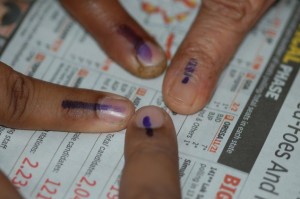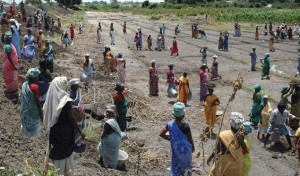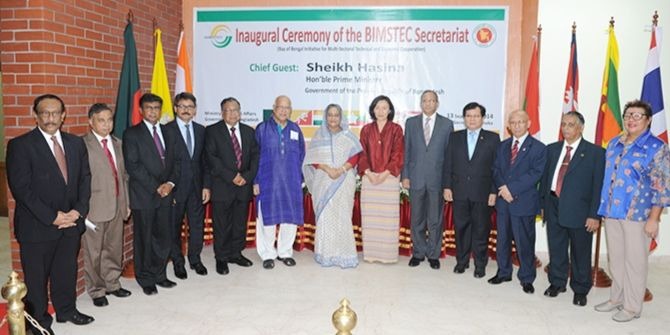Hemal Shah asked LSE academics and Indian journalists, parliamentarians, policy analysts, and economists what challenges India should prepare to tackle in the new year. Here’s what they said…
1. Economic Reforms 2.0
The Indian government’s failure to initiate second-generation economic reforms has been widely criticised this year. Lok Sabha MP Baijayant Panda explains this is because Indian politics has long grappled with the question of whether good economics makes for bad politics. “The reality may well be that the benefits of economic reforms – as spelt out by economists such as Jagdish Bhagwati, Arvind Panagariya, Amartya Lahiri and others – have never been properly spelt out by politicians, at least at the national level.”
Although a long-standing vote to allow FDI in multi-brand retail passed through Parliament on 7 December, Vivek Dehejia, Associate Professor of Economics at Carleton University and author of Indianomix, calls for bolder reforms: “FDI is important, but FDI cannot be a magic bullet that fixes what is ailing the economy. We need major, and politically difficult reforms – like labour law reform and elimination of all non-transparent ways of things like land allocation – by overhauling the regulatory infrastructure to bring in more transparency and tackle corruption.”
2. Governance
For Gurcharan Das, author of India Grows at Night, India’s top challenges in 2013 are“governance, governance, governance.” It became apparent this year that getting things done in a large, fractious democracy such as India isn’t going to be easy. “Getting anything through in the Parliament has become quite difficult as the opposition for its own political end wants to disrupt Parliament. It is a big challenge to get through important legislation to push forward the reform agenda,” says economist Dehejia. So what can be done to improve efficiency and governance? MP Panda suggests small tweaks in India’s parliamentary system, including the elimination of the need for consensus between government and opposition on which issues need voting, stable tenure for governments, and a German-style constructive vote of no-confidence that requires voting for a new leader rather than simply challenging the incumbent.
3. Voter turnout
India’s political parties will be revving up for the 2014 national elections throughout next year. But are Indians equally excited about casting their votes? “Despite deep scepticism about politicians, a large part of the Indian electorate, especially those drawn from the most disadvantaged sections of society, vote enthusiastically and in large numbers,” explains Dr Mukulika Banerjee,Reader in Social Anthropology at LSE and author of the forthcoming book, Why India Votes (2013). She hopes that voter turnout will be spurred by the recent entry of social movements that have critiqued corruption scams in the political arena. Others are not as optimistic: “It remains to be seen whether the growing middle class’s engagement and activism on the corruption issue will translate into an increase in their abysmally low voter turnout record,” says MP Panda. Echoing this concern, M. R. Madhavan, co-founder of PRS Legislative Research, points out that after the 2008 terrorist attacks in Mumbai, “there was massive public outrage … however, the general elections held six months later saw a turnout of about 45 per cent in Mumbai, more than 10 percentage points below the national average.”
4. Engaging China
The issue of India’s engagement with China remains yet to be settled. “India and China are just beginning to explore the potential for bilateral relations,” says Dr Sanjaya Baru, Director of Geo-economics and Strategy at the International Institute for Strategic Studies and former member of the National Security Advisory Board. Cautioning against a hostile bilateral relationship, Dr Barupredicts that “China will emerge as an important investor in India, but that process will evolve gradually as trust builds up. Being neighbours, China and India would be wise not to become foes, even if there isn’t much friendship and both compete for influence in Asia and the world.” When it comes to dealing with China, Baru reiterates Prime Minister Manmohan Singh’s advice of “competition and cooperation, hopefully not conflict.”
5. Boosting human development indicators
The new year takes India one step closer to meeting the human development targets outlined in the Millennium Development Goals. So how should India prioritise development initiatives in 2013? LSE Professor Emeritus Lord Meghnad Desai suggests India should create as much employment as possible to absorb the demographic dividend; tackle malnutrition especially for children; and work towards preventing gender discrimination. He also proposes a novel way for India to facilitate such development using foreign aid: “The efficiency of delivery and design of project is more important than the money; India should bid for those things and hire DfID in a way that we get DfID expertise.”
6. Improving MGNREGS
Touted as the flagship of the UPA government, the Mahatma Gandhi National Rural Employment Guarantee Scheme (MGNREGS) costs the Indian taxpayer US$9 billion annually. But the scheme has been criticised for corruption, delayed payments, and the poor quality of public works completed under its ambit. “[The scheme] is not providing as much employment as they say,” says Lord Desai, adding that “it should not be used both as an anti-poverty device and as employment scheme… Adequate asset creation is also important because right now what is given is aid.”
Consequently, Dr Mihir Shah of the Planning Commission of India looks forward to MGNREGS 2.0. “2013 is a crucial year for MGNREGS as the new avatar of the programme designed in 2012 will face its first test of implementation,” says Shah. “There is now a greater focus on the creation of durable assets and sustainable rural livelihoods.” Transferring welfare benefits directly into bank accounts through Aadhaar (universal identification scheme) is also slated for implementation early next year. “Aadhar-linked benefits transfers, including MGNREGS wages, have the potential to reduce leakages, improve transparency, and deepen financial inclusion,” explains Karthik Muralidharan, Assistant Professor of Economics at the University of California at San Diego. But he reminds us that the main challenge will be to ensure adequate business correspondent network coverage eventually needed to handle transactions and cash management.
7. Toeing the Line (of Control)
Shyam Saran, former foreign secretary of India, believes that Pakistan (along with China) will remain India’s major security challenge in 2013. “Solving India’s ‘security problem’ in Kashmir necessitates a policy of genuine and sustained political engagement with the alienated sections of Jammu & Kashmir’s population, particularly in the Kashmir Valley,” explains Sumantra Bose, Professor of International and Comparative Politics at LSE. He believes that “a problem of national and democratic integration continues to exist in J&K and an ‘ostrich posture’ will not make it disappear.” But how would Pakistan react to greater engagement by the Indian government in Kashmir? “Reaching out to estranged citizens in Kashmir, especially in the Valley, should not be seen as either pandering to Pakistan or as ‘minority appeasement’, but as advancing the integration of a perennially restive region with the Indian Union,” says Bose.
8. Guaranteeing the right to education
The Right to Education Act passed in 2009 opened up private schooling to pupils from economically weaker sections (EWS). UCSD’s Muralidharan studies the impact of school choice programmes in India, and believes that “the 25 per cent reservation for EWS in private schools has the potential to transform Indian primary education by reducing social stratification and providing students with access to a broader range of schools, including those that they might not have been able to afford earlier.” But the challenges in implementing this reservation lie ahead. According to Muralidharan, major hurdles include “designing and implementing transparent procedures for allocating these places (ideally by a centralised lottery), verifying enrolments, and promptly transferring payments for the EWS category to the concerned schools as per the agreed formula.”
9. Negotiating nonalignment
Former ambassador and foreign secretary Saran believes that “there is a great deal that India has to offer in meeting the growing global challenges in public health, education, and poverty alleviation”, and calls for India to play a more active role in the G-20. But he also argues that India should “articulate its position on any issue firstly considering its merits and secondly after a careful assessment of India’s own interests.” His comments seem prudent in light of India’s oscillating stance on international affairs this year: India abstained from voting for the no-fly zone in Libya while Muammar Gaddafi used force to suppress a domestic uprising against his rule, but later voted in favour of a Syrian resolution to urge President Bashar al-Assad to stop violence. Similarly, India refused to respond to Maldives’ undemocratic arrest of former president Mohamed Nasheed at gunpoint, but voted for a US-backed resolution to investigate Sri Lankan war crimes. Referring to these policy decisions, Saran clarifies that “being vocal on issues or being partisan does not necessarily translate into good diplomacy.”
10. Protecting freedom of speech online
This year, Indians’ freedom of expression online came under attack by the authorities. For example, in November, a 21-year-old girl was arrested for posting a Facebook status update condemning the Mumbai bandh to commerate Bal Thackeray’s passing, along with her friend who ‘liked’ the post. Pranesh Prakash, Policy Director at the Centre for Internet and Society in Bangalore, recalls that in August state censorship led to the blocking of 309 web pages, some Facebook groups, and Twitter streams. “State-compelled censorship has also extended to unlawful requests from government officials to Google to remove ‘defamatory’ material,” he adds. Remarking on this censorship, Vibodh Parthasarathi, Associate Professor at Jamia Millia Islamia, adds “what is intriguing is the rather guarded tone adopted by television journalists in their criticism of net policing; sometimes their support for ‘freedom’ on the internet contains caveats, which they would strongly oppose if it were to apply to TV.” In this evolving scenario, Prakash recommends a vigorous engagement between government and civil liberties watchdogs to curb excess censorship.
Hemal Shah is a public policy researcher at the Legatum Institute, a London-based think tank. She completed her Masters in Development Studies from LSE in 2010, and tweets at @hemalshah_7












I do agree a lot with what your article states. One thing I think a lot of people in India is forgetting as one of India’s top problem is infrastructure. I don’t think India has well enough infrastructure to be referred to as a modern or developed country. The buildings, and streets of India are overall in bad shape. I don’t see India doing anything about this problem. There probably isn’t proper plumbing in a lot of low class and some times middle class Indian families. Or even a lot of low class Indians might not have home and might be building shaggy places that makes India look like a homeless country all around.
India, please do your self a favor, present your country in a decent way. Start with the infrastructure- like roads, buildings, homes, businesses! You know more than I do what needs to be done in these areas.
Come On India! I can’t say I am a proud Indian yet, but that’s because Indian government hasn’t given me a reason to say I am a proud Indian yet!
These issues are Really Pulling India down from Being a developed Country.
top 10 issues of india 1 political stability corruption ; under development of social and economical ;social discrimination ,lack of ecconomic inclusion inequality in wealth distribution , gender insensitivity , regional and communalism , terrorism
Well, firstly, when I read through this article, I was happily surprised that many of the issues that we have been talking about in India have not even been referred in this article. This is quite a new kind of list.
Well does that mean, the other issues are gone? Not really. In fact, many of the issues listed here, are an advanced form of those issues of caste, sexuality, class, religion and such identity dynamics. Which in turn are the issues that root from issue of how we understand power and how do we educate ourselves and our children about it. But it seems our academicians, journalists, parliamentarians, policy analysts, and economists have got bored of talking about these issues. After all ranting about the same problem and not being able to devise any solution is not cool, is it? For example, look at challenge no. 10. Of course it is important to protect the voice of people and free speech, but why only online? Despite all the internet revolution, only about 2% of rural Indian population is online. What’s about the voices of several marginalized groups (rich and poor included) who are not even bothered about fancy issues but speak to survive and are ruthlessly curbed?
I think, as a society, we need to go back to basics.
top challenge is population
I think population will be our biggest asset . India is a young country with more than 65% under the age of 35 . In other western countries the reverse is the trend (including China mainly because of its one child policy). Moreover the western economies have reached a saturation level. They’re looking for Asian & African countries to expand their economies , particularly India. That’s the reason why every country want to have friendly relations with India . Our main challenge lies in harnessing the population.
wow…..
Corruption and increasing populations are root cause to almost every problem.
This huge populations and building of infrastructure which utilizing huge natural resources. and damage to environment.